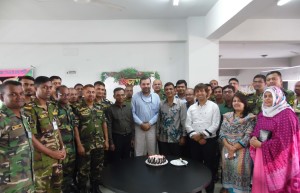Public sector finance has always been instrumental in the development process of any nation, and due to sustained fiscal pressure coupled with limited resources, Public Financial Management (PFM) and value for money have become more crucial for the government. PFM is a broad concept which comprises various components: budget planning, budget execution, resource management, financial reporting and auditing. In order to keep pace with a fast moving economic environment, nations are embracing performance based budgeting instead of traditional incremental approach along with advanced financial reporting standards.
A priority based budgeting in line with national strategic policy objectives and complex public services have created a huge demand for advanced financial management skills and competencies. As a result, professionalism in finance is becoming one of the core prerequisites in the domain of PFM. Developed nations have already put finance at the hub of decision making so that public services can be rendered in a most economic manner. In this growing trend of professionalism in public finance, developing nations can hardly keep themselves away from this sprint track. And, Bangladesh, a developing nation has no intention to fall behind in the path of professionalizing PFM.
PFM and CIPFA: Apart from other components of financial management, the World Bank identified accounting and auditing as two fundamental aspects of PFM: Accounting facilitates budget controlling, monitoring and hence decision making; auditing aims on ensuring accountability and transparency financial management. In order to build a sound and efficient PFM and hence to provide quality financial reporting and auditing, Supreme Audit Institution (SAI) of Bangladesh is striving to build a group of professional accountants and auditors. These professionals are expected to apply international accounting and auditing standard and to emerge as key players in high-quality PFM. In this connection, the Comptroller and Auditor General (CAG) of Bangladesh has launched Chartered Institute of Public Finance and Accountancy (CIPFA) training through a capacity building project.
CIPFA, the lone professional accountancy body in the world entirely dedicated to public sector finance is a UK based institute. The main purpose of CIPFA is to developing competencies and abilities of staff in PFM. This course offers a range of proficiencies from public sector accounting, auditing, managing finance to strategic public finance, and business change management through 12 papers/modules.
CIPFA achievements in SAI Bangladesh
Full CIPFA member 10
Associate member 25
Affiliate member 40
Certificate holder 176
In order to champion the public sector finance skills, CIPFA regularly updates the modules and syllabus in line with the most recent issues in PFM. A CIPFA graduate does not only excel in public finance and accountancy but also display the qualities of a strategic decision maker and an excellent leader. Therefore, CIPFA qualified staffs are highly likely to contribute to PFM by bringing the sophisticate and profound knowledge of public finance, public service delivery and financial reporting.
CIPFA and FIMA: To ensure the effective functioning of CIPFA training programme, the CAG has delegated the responsibility of facilitating training with befitting logistic support to Financial Management Academy(FIMA) which is the training wing of the SAI, Bangladesh . FIMA is entrusted with the duty for imparting training to upgrade and enhance the auditing and accounting knowledge, skills and attitude of this department through systematic and planned training programs.
With the commitment to develop professionalism in PFM, FIMA is extending all out support for CIPFA training programme. Comfortable class rooms with adequate digital teaching equipments are some of the basic features of FIMA. Capacity of FIMA is noteworthy, as three/four batches of CIPFA course classes, examinations go simultaneously at different rooms without interrupting the regular other training courses at FIMA. These facilities have smoothed the progress of CIPFA training.
CIPFA training batches at FIMA
Level No. of batches
Certificate 8
Diploma 6
Advanced Diploma 3
Furthermore, faculties of FIMA render invigilation during CIPFA examination conducted in FIMA. An excellent learning environment in FIMA has resulted in a successful performance of CIPFA in the audit and accounts department of Bangladesh. Both overseas and domestic resource persons for CIPFA appreciate the effort of FIMA in making the CIPFA experience possible in Bangladesh.












